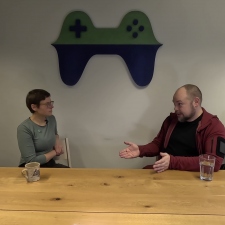While their 10 week quest to spread a message of sustainability while visiting games studios across Europe may be over, there's still plenty to learn and enjoy from the videos that CEO of Matchmade Jiri Kupiainen and GamesForest.Club's Maria Wagner made along the way.
We followed them week by week - click here to see the series in full - as they documented their travels with exclusive video interviews with the big-name studios they visited.
Their message is a simple one. Unless we all get smarter about the necessity and logistics of our business travel, the global turnaround in CO2 production that we're all praying for isn't going to happen.
Here's part two of their video from Helsinki featuring Mikael Haveri from Finland's first and oldest game development studio Housemarque and Jani Kahrama, founder of Secret Exit Inc with commentary from Jiri below. And don't miss part one from Helsinki, featuring Pengfei Zhang of Yahaha here.
Jiri Kupiainen: Whose emissions are they anyway? “The responsibility should always flow upstream” says Jani Kahrama, the primus motor behind the Finnish games industry’s half a million euro donation to protect old growth forests, who we interviewed in the second part of our Helsinki episode below.
British Petroleum invented the concept of the “carbon footprint” and popularised the idea that in the end, individuals are responsible for all the emissions associated with the way they live their lives. But as everyone who tries to lower their individual carbon footprint knows, quantifying how bad of a person you are is a nearly as hard as trying to make up for those sins. Knowledge and data gets better the closer you are to the emissions, which implies that we have it all backwards - which is of course exactly what BP wanted.
Both the experiences of playing games and making them are several steps removed from the carbon emissions and biodiversity loss caused by the games industry. In the end, the majority of our industry’s carbon footprint comes from the hardware - ranging from servers to mobile phones - needed to run these games, and the electricity that powers that hardware. Though that’s also relative - a 2019 study estimated that the production and transportation of one PS4 emites the equivalent of 89 kilograms of CO2, which is about one eighth of a round trip flight from Helsinki to Berlin.
Who's making a difference (and who isn't)?
Today, most of our industry’s climate and environment protection initiatives are led by game developers. There’s Jani’s Pelimetsä, there’s Playing for the Planet, and there is The Games Forest Club. But, where for example are the people who make the software and hardware that these games run on?
Apple has a more than 50% profit margin on its iPhones and takes 30% of App Store transactions. Who knows exactly how much electricity is used to charge these phones and where, and how much energy each app on a phone uses. If responsibility indeed flows up, what is Apple’s responsibility and how do we get them involved?
In the end emissions need to be reduced at the source, and doing this requires a system of emissions accounting and taxation. Yesterday, the European Parliament approved major reforms to the EU’s carbon market, and importantly voted in favor of a new border tariff for high-carbon imports. Maybe one day we’ll end up with a true “polluter pays” system combined with a carbon dividend that ensures that poorest of the society aren’t hurt by increases in prices of services and goods. And if that’s where we’re headed, maybe Hilmar from CCP was right in that the best thing we can do is to help people fulfill their emotional needs virtually, and use the massive reach we have to make sure that political change happens as quickly as possible.





















